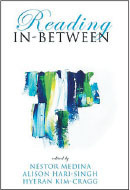An extended review of a 2021 book by Néstor Medina, Alison Hari-Singh, and HyeRan Kim-Cragg
Edited by Néstor Medina, Alison Hari-Singh and HyeRan Kim-Cragg
Pickwick Publications, 2019. 147 pages. $26 (e-book $10)
Canada  is a society of growing ethnocultural diversity, although white Euro-Canadians have been our dominant voices. This predominance is also evident when it comes to how we read the Bible. Reading In-Between aims to make more room for minority insights on Scripture.
is a society of growing ethnocultural diversity, although white Euro-Canadians have been our dominant voices. This predominance is also evident when it comes to how we read the Bible. Reading In-Between aims to make more room for minority insights on Scripture.
The editors explain this to be difficult work. “For those of us from minoritized backgrounds, the sway of the dominant Euro-Canadian culture of the North Atlantic often places a set of blinders on us that dampen our ability to reflect theologically from our own ethnocultural vantage point,” they write.
This volume contains six essays followed by two responses to the essays.
First, Alan Ka Lun Lai (Chinese Canadian) discusses ways in which Confucian teachings on piety and suffering provide a framework for the Christian gospel.
Then Barbara M. Leung Lai (Chinese Canadian) discusses “Narratival Hermeneutics” as a way for Chinese Canadian communities to read Scripture. She sees Ecclesiastes as echoing the Chinese Canadian’s search for meaning while living “In-Between” cultures.
The third essay, by Korean Canadian HyeRan Kim-Cragg, presents the cultural tension of shifting from a culture of sitting cross-legged to a “high-chair” culture. In this light she discusses other ways that we might perceive the story of Jephthah and his daughter (Judges 11:34–40). How might a Korean Canadian women’s group understand this passage?
For the fourth essay, Néstor Medina (Latino Canadian) argues we can see a “lived hermeneutic” happening among the Latina/o Canadian communities. One of the ways this plays out is through the oral reception of the text. As he says, “the meaning of the text is not reduced to or expressed in ‘systematic,’ written articulations.”
Then Alison Hari-Singh presents an Indian Canadian approach to reading Scripture. She argues that the example of Sadhu Sundar Singh’s notion of Christian bhakti is a way for Indian Canadians to engage with the Bible.
The final essay by Indigenous theologian Ray Aldred (with Catherine Aldred-Shull) discusses Bible translation. Aldred builds on the notion that the task of translation is “to put the gospel story, the canon of Scripture, into the heart language of all people.” How can any text be properly translated into any language if it is not done by a native speaker? Thus, Aldred argues that, considering the organic nature of gospel translation, a “hermeneutic of love” is required “on a trajectory toward a new community that recognizes the inherent value of diversity.”
The final two essays respond to the previous six. Gosnell L. Yorke (Caribbean Canadian) provides a helpful critique and praise for the essays. Then Greer Anne Wenh-In Ng (Chinese Canadian) responds with a sort of encapsulating overview and appeal for further work in this area. She argues (drawing on Gale A. Yee and also W. E. B. Du Bois) for more works in this area: scholarship that is by, about, and for minoritized cultural communities.
This volume, though already a couple of years old, is still important because the need for more work like it remains urgent. As for myself, being from a majority cultural community, I learned much from this book. I learned ways in which I have assumed my own approach to be objective or correct when my perspective is merely one of many that seeks to understand the revelation of God with us.
All Canadian Bible readers can benefit from this book. As Yorke puts it in his response essay: “This long-overdue volume comes as a confident and clarion call for us to take cognizance of and to listen to the erstwhile muted hermeneutical voice of all minoritized and racialized Canadian Christians.”
If you are white, this book can help you learn to appreciate, and listen to, other perspectives of people sitting in the pews with us. If you are a minority, this book can encourage you to express your culturally shaped voice.
Editor's note: We love our reviewers, but we don’t always agree. You won’t either, maybe especially in the Bestsellers and Roundup sections. Do let us know what you think. Sample chapters of most books can be viewed at Books.Google.ca and Amazon.ca. Faith Today earns a small commission when people make purchases using our links to Amazon.ca.